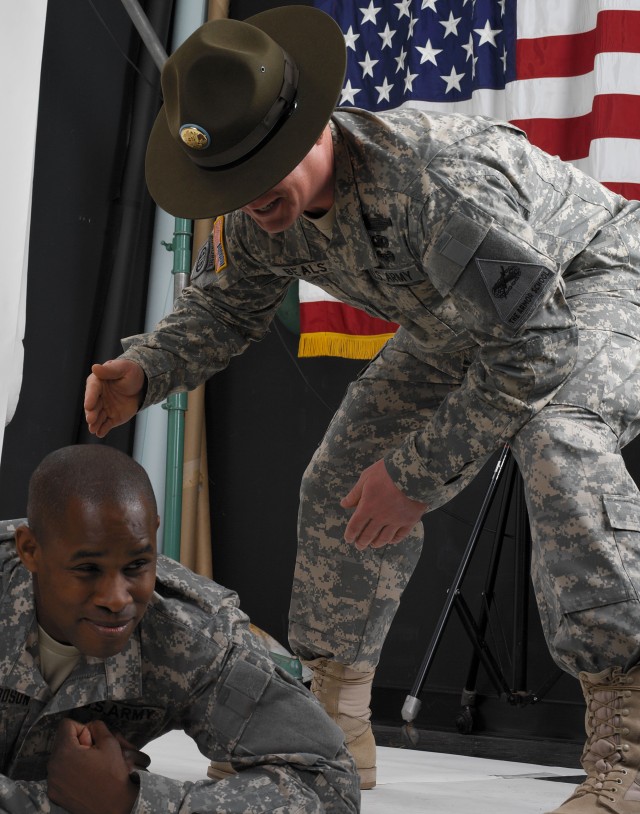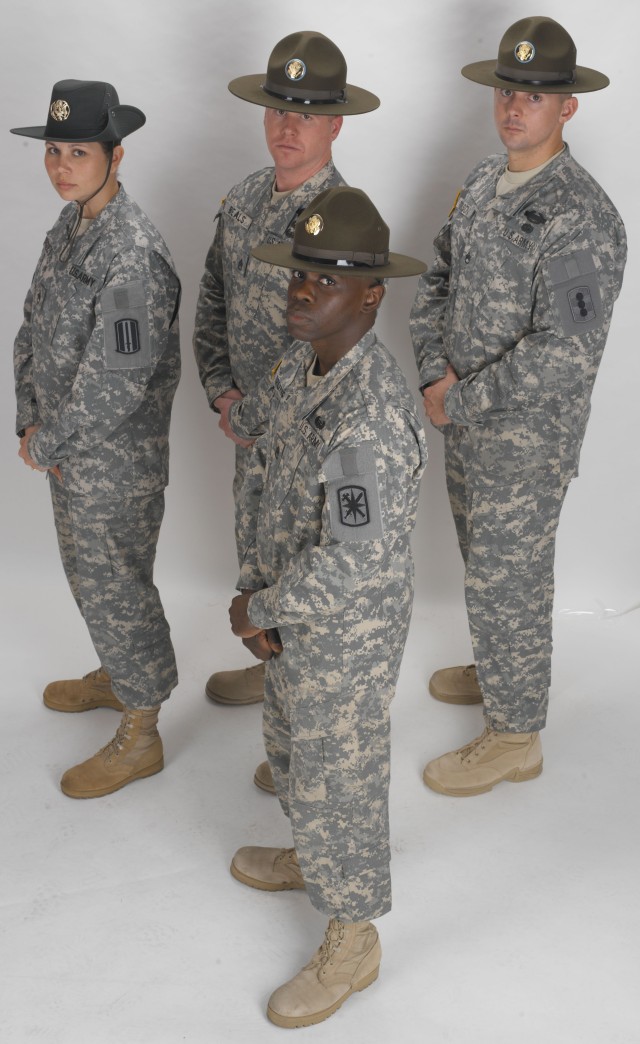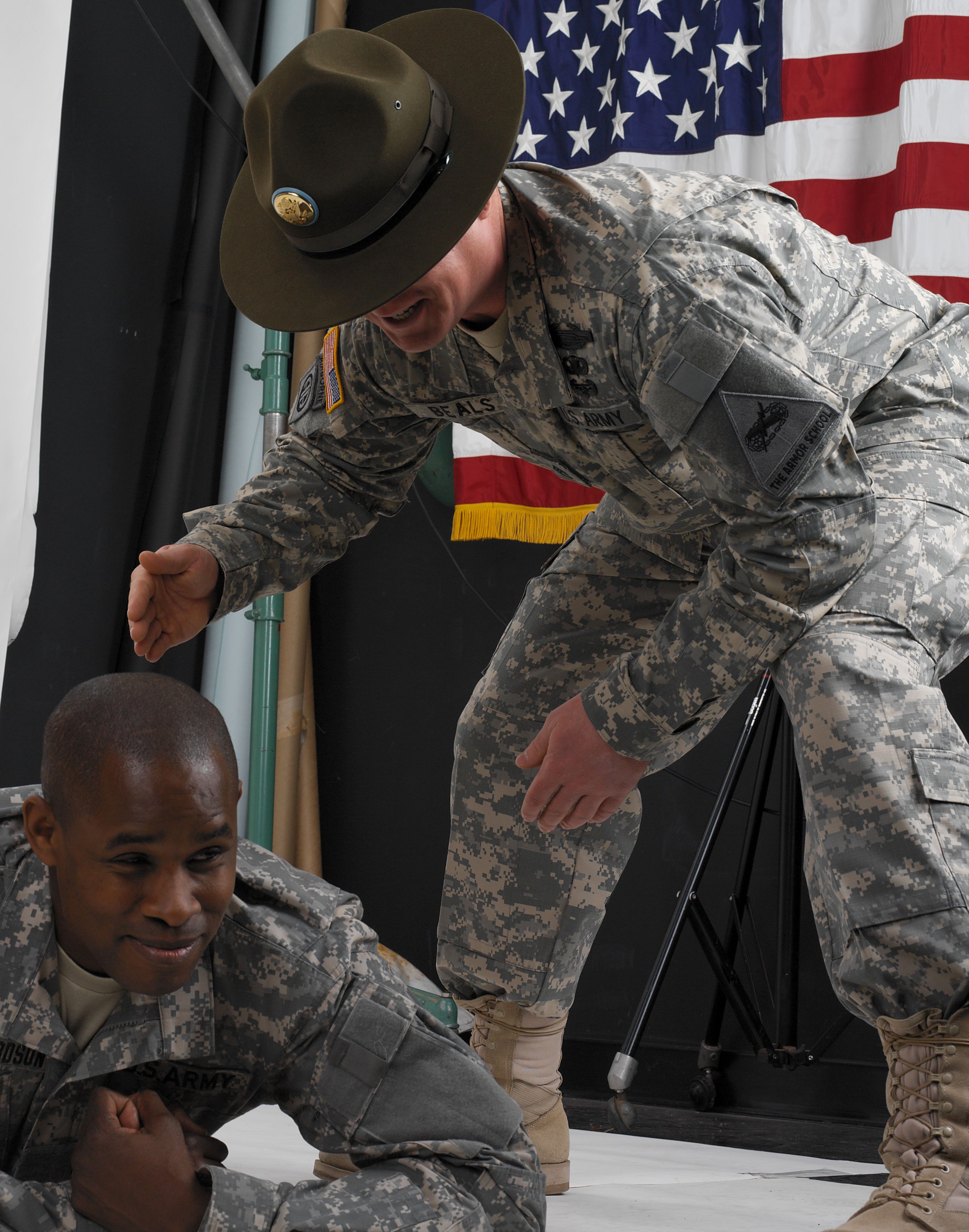For years Hollywood has presented Army drill sergeants as gruff, in-your-face, yelling, and spitting Mad Max machines. And perhaps once-upon-a-time its stories portrayed an image that was partly deserved.
But like all stories that include once-upon-a-times, this one too has more than one version.
"I think the biggest misconception about drill sergeants is that we are paid (to be) mean--which completely isn't true," said Staff Sgt. Stephanie Rodriguez, a drill sergeant from Fort Jackson S.C. "It's more of a tough love-type story. There is a time for discipline and a time for praise, and where I am from, everyone gets both."
Rodriguez, who was originally a chemical operations specialist, said that her main role as a drill sergeant is as a mentor.
"You have to discipline them when it's necessary, and you also have to praise them when it's necessary," she added. "I can't constantly yell at Soldiers and expect them to receive me when I actually have to sit down and teach a class. So it's a good combination of the discipline and the praise as well."
Rodriguez, and fellow drill sergeants Dashawne Browne, Jeremy Beals, and Jason Harrison spent the first part of 2009 touring different events around the U.S. to answer questions from the general public about what it means to be a drill sergeant, and how basic training is really conducted. One of the things they noticed is that the public has a few misconceptions about what their job actually entails.
Browne, a drill sergeant at Fort Leonard Wood Mo., said one such misconception is that all a drill sergeant does is yell.
"That's all (the public) sees in the movies, 'Aren't you supposed to yell, drill''
What they need to understand is that yelling is an attention getter," Browne said. "You can't yell at everyone. You have to use, as my (noncommissioned officers) used to tell me...your tool box and you need to use those different tools. You can't always yell at someone to get them to do what (they need to do.)"
Browne said that each person is different and depending on their individual backgrounds a drill has to use the "tool" that works best for them. For example, yelling may work with one person, but a casual request will work with another.
"A lot of times I sit down and I have to get on that Soldier's level, and say 'This is what we have to do for training, this is what we do for BRM, this is what we do for first aid, and this is how we teach this class,'" he added. "So they can see I am not here to... drill you, demean you and break you down, I am here to build you up and train you to be a Soldier."
But the ultimate goal of any mentor is to teach someone to be a better person, according to Beals, who is a drill sergeant at Fort Knox, Ky.
"I believe the most important role for me is not only to be a subject matter expert and teach these kids how to be a Soldier, but to teach them how to be a better person," he said. "To give these kids the values they came to learn-a lot of them come here just to be a Soldier, that is the easy part ...The hard part of the job is to teach them how to be a better person, how to be a better member of society."
Beals, who has deployed to Iraq and Afghanistan for a total of three deployments in four years, is a battle-hardened infantryman. He said he volunteered for duty as a drill sergeant because he wanted to teach future Soldiers all the lessons he learned in those three deployments.
"The Army has had a significant impact on me," he explained. "It taught me to grow up extremely fast ...it taught me a lot about myself (and how) to overcome obstacles. And it has taught me a lot about personal courage more specifically the Army values - loyalty, duty, respect, selfless service, honor, integrity, personal courage."
He also said that that being a drill sergeant isn't just about teaching trainees to march and shoot-they help the Soldiers in many different ways.
"We provide more than just physical, mental and emotional guidance for them. You are a father, a preacher, a financial advisor, a counselor-you provide so many different services to the Soldier that the regular public doesn't see on day to day basis," Beals explained. "They see what they see in movies and what they hear about by word of mouth. But you are fulfilling so many roles other than just being a trainer and teaching an individual how to be a Soldier in the Army."
And Browne added that a drill is also about being that person a trainee may never have had in their life.
"In one way to sum it up I am that parental guidance, whether they are male or female, that they might never have received, and I am held to that standard every day I come to work," he said.
All four drill sergeants emphasized the need for the seven Army core values training and said that if drills don't teach them what basic values are, some of their trainees won't make it far in the Army, or in life.
"The Army wants to give you a set of standards to live by because morally and ethically it gives you a basis to treat all Soldiers and people across (the world) the way you would want to be treated," said Harrison, who is a drill sergeant at Fort Sill Okla. "We have a standard base for that and we train these Soldiers and bring them up in (the seven Army core values) They (can) understand where we are coming from and how they need to treat other people."
Browne further explained that not everyone's values are the same, and the Army values put everyone on the same page.
"Everyone has values...you value something, you value human life, your play station, your Wii, and you value your clothes," Browne said. "But in the military we explain how you compare the Army values to life. This is how you show loyalty to your country, this is how you compare selfless service when you do your job, your duty, and we explain it to them-this is how we do it...It is your duty to do (your job) and it is expected of you."
To the basic trainee a drill sergeant is expected to be all things, but above all else they uphold a standard - a standard embodied in the Army values. And to Harrison, his campaign hat is a symbol of that standard.
"I love my campaign hat," he explained. "I tell everyone who wants to touch it and put it on that it's worth a lot of blood, sweat, and tears that people before me have set the standard for and I'll continue to be a standard bearer thought the years with that hat."
But, Beals added, a drill sergeant can't ever let the hat make them into somebody they aren't..."because the hat is a symbol of authority, discipline and obedience, and it isn't to be taken lightly. The drill sergeants have earned it and we wear it with pride."




Social Sharing